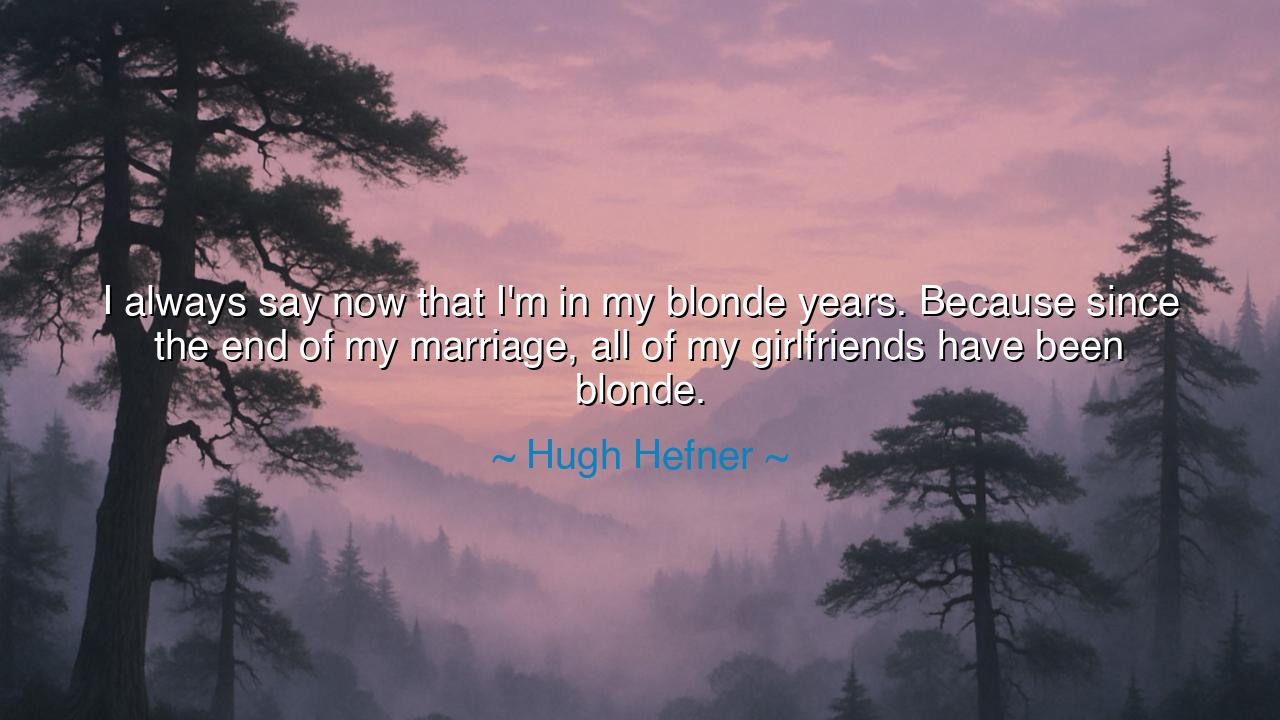
I always say now that I'm in my blonde years. Because since the
I always say now that I'm in my blonde years. Because since the end of my marriage, all of my girlfriends have been blonde.






In the playful yet revealing words of Hugh Hefner, we find more than the wit of a man renowned for his charm and extravagance. “I always say now that I’m in my blonde years. Because since the end of my marriage, all of my girlfriends have been blonde.” On its surface, the line glitters with humor and lighthearted vanity, a reflection of the lifestyle Hefner famously embodied — a man surrounded by beauty and youth. Yet beneath the jest lies something more human, more ancient: a meditation on change, identity, and the cycles of desire. For Hefner, “the blonde years” is not merely a description of preference, but a symbolic passage — a new era in the long narrative of his life.
Every life, as the ancients knew, unfolds in seasons. Just as the earth turns from spring to summer, and from autumn to winter, so too does the soul move through stages of passion, loss, and renewal. Hefner’s “blonde years” represent not merely his taste in women, but the rebirth of self that followed the ending of a great union. When a marriage dies, a chapter of one’s spirit closes, and the heart seeks to rediscover its rhythm in the embrace of change. His humor masks the truth of a man standing between what was and what is yet to be — reinventing himself, not through philosophy or solitude, but through the pursuit of beauty and vitality.
To the wise, such transitions are as old as humanity itself. The Greek philosopher Epicurus, though a man of simplicity, taught that pleasure — rightly understood — was the pursuit of what brings peace to the soul. To live well, he said, is not to drown in indulgence, but to savor the sweetness of existence without fear or regret. In Hefner’s words, we glimpse this pursuit of pleasure as a kind of philosophy, one that seeks to reclaim joy in the wake of loss. Though his “blonde years” may appear superficial, they are in truth his declaration that life, even in its later seasons, can still glitter with renewal and delight.
But there is also irony in Hefner’s reflection. The man who built an empire of desire found himself marking time not by age or achievement, but by hair color — a symbol of the fleeting nature of beauty and the transience of pleasure. The ancients would have smiled knowingly at this. The Roman poet Ovid, in his Metamorphoses, chronicled how men and women constantly transform — sometimes to escape, sometimes to endure, sometimes merely to feel alive again. Hefner’s transformation into his “blonde years” mirrors this eternal human impulse: the longing to be reborn after heartbreak, to find meaning through the senses when reason falters. His jest conceals the truth that pleasure, for him, was not an escape from mortality, but a defiance of it.
Yet in his jest there is also melancholy, for Hefner’s pursuit of youth — his golden era surrounded by blondes — was both his triumph and his tragedy. Like the emperors of old who feasted beneath golden ceilings, he sought eternity in the ephemeral, love in the transient. And yet, perhaps, that was his way of grappling with the truth all must face: that time devours beauty, and even the sunniest days must fade. The “blonde years” were Hefner’s answer to the silence that follows love’s end — his refusal to surrender to loneliness or despair. In the face of time, he chose laughter and light, as though to say: If life must pass, let it pass in color and music, not in shadow.
There is an ancient parallel in the story of Solon, the wise lawgiver of Athens. When asked late in life whether he regretted his youth, he answered, “No — for I have learned to be young in wisdom, not in age.” Hefner’s “blonde years,” though painted in jest, echo that same sentiment. They remind us that even in the twilight of life, one may still embrace joy, curiosity, and vitality — if not through ideals, then through experience. Where others see aging as decline, Hefner saw it as transformation — a new season to be lived with unashamed pleasure, a new identity to inhabit with wit and warmth.
The lesson, then, is not about hair color or romance, but about embracing the evolution of the self. Every ending births a new beginning; every sorrow can give rise to a new form of beauty. Do not fear reinvention — whether it comes through love, art, or laughter. Learn, as Hefner did in his way, to celebrate the chapters of life, to live each one fully, without apology. Yet also remember what the ancients taught: that pleasure without reflection is hollow, and freedom without purpose is fleeting. Let joy be tempered by wisdom, and transformation by gratitude.
So, dear listener, as you pass through the seasons of your own becoming, take to heart the paradox of Hugh Hefner’s words. Live your “blonde years,” your “silver years,” your every year with a spirit that refuses to fade. Seek not to escape the changes life brings, but to dance with them — to meet each new season not with fear, but with curiosity and grace. For though the colors may change, it is the light of the soul that makes them shine.






AAdministratorAdministrator
Welcome, honored guests. Please leave a comment, we will respond soon